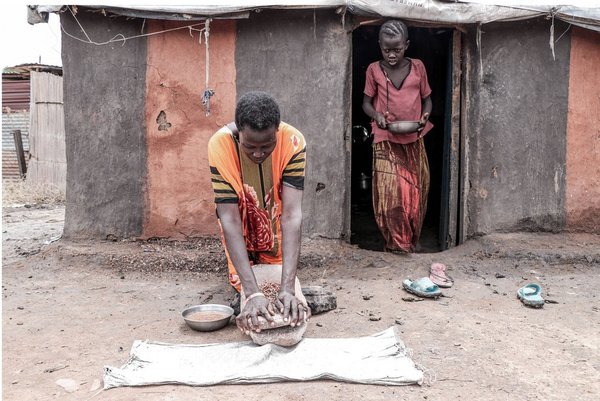- Share this article
- Subscribe to our newsletter
Welthungerhilfe calls for more determined effort to achieve zero hunger
“Hunger is one of the world’s biggest solvable problems. With Agenda 2030 and its 17 Sustainable Development Goals, we have a good strategy for permanently ending hunger. But we have to make a significantly more dedicated effort to implement it,” said Welthungerhilfe President Marlehn Thieme, presenting her organisation’s Annual Report in Berlin/Germany in mid-July.
Worrying developments
According to the latest estimates by the United Nations Food and Agriculture Organization (FAO), some 735 million people were chronically undernourished last year, which is 122 million people more than at the beginning of the coronavirus pandemic in 2019. The global price hikes triggered by the war in Ukraine have made staple food prices unaffordable for many people; fertiliser shortage has affected farmers across the world.
In addition, there are the impacts of climate change, which are becoming particularly marked in the Horn of Africa. In this region, according to the United Nations, by the end of 2023, up to 43 million people will be dependent on humanitarian aid; and the UN Refugee Agency (UNHCR) states that in 2022, more than 108 million people were displaced – more than ever before.
Draft budget giving the wrong signal
“The budget cuts planned by the German government for 2024 are giving the wrong signal in times of greatest need and are jeopardising the implementation of Agenda 2030,” Thieme cautioned. According to the German Federal Government’s budget draft of the 5th July, the 2024 budget of the Federal Ministry for Economic Cooperation and Development (BMZ) is to drop from this year’s 12.2 billion euros to 11.5 billion euros in 2024; instead of the present 2.7 billion euros, the Foreign Office is to have a mere 1.7 billion euros at its disposal next year.
Thieme welcomed that food security now also represented an important topic in the international climate negotiations, and that today, the discussion was no longer restricted to cultivation issues and raising yields, but that it aimed for the goal of a comprehensive transformation of the agriculture and food system towards being fair and sustainable and offering people in rural areas even more support and integration.
No one-size-fits-all solution
Here, agro-ecological concepts held a major potential, maintained Welthungerhilfe Secretary General Mathias Mogge. They could make agriculture as a whole more ecological and more compatible with the environment and society. They should nevertheless not be regarded as a panacea when it came to providing food for the world’s population. Locally adapted solutions were important. Regarding new breeding methods, “we should not shut the door right from the start”, Marlehn Thieme responded to a journalist’s question. “The challenges which climate change is posing are so great that we need swift solutions for some countries.” It was important to ensure that the relevant technologies were not in the hands of a small number of players.
Silvia Richter, editor, Rural 21
More information:
Welthungerhilfe's Annual Report (in German; English version to follow)





Add a comment
Comments :